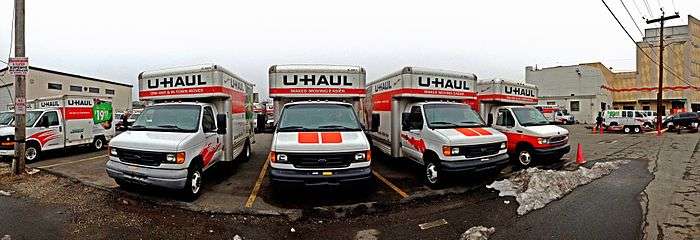U-Haul
U-Haul is an American moving equipment and storage rental company, based in Phoenix, Arizona,[1] that has been in operation since 1945. The company was founded by Leonard Shoen (L. S. "Sam" Shoen) in Ridgefield, Washington, who began it in the garage owned by his wife's family, and expanded it through franchising with gas stations.
 | |
| Subsidiary | |
| Traded as | NASDAQ: UHAL |
| Industry | Rentals |
| Founded | 1945 Ridgefield, Washington, U.S. |
| Founder | Leonard Shoen |
| Headquarters | Phoenix, Arizona, U.S. |
Key people | Chairman, CEO: Joe Shoen President: John "J.T." Taylor Vice President: Jamie Lee |
| Products | Truck rentals, trailer rentals, tow hitches, self-storage |
| Revenue | US$4.02 billion (2006) |
Number of employees | 18,000 (2017) |
| Parent | Amerco |
| Subsidiaries | Uhaul Car Share |
| Website | uhaul |
Overview
U-Haul is owned by AMERCO (NASDAQ: UHAL), a holding company which also operates Amerco Real Estate, Republic Western Insurance, and Oxford Life Insurance.[2] The Shoen family currently owns, both directly and indirectly, about 55% of the publicly traded stock corporation.[3] The company rents trucks, trailers, and other pieces of equipment, but many U-Haul centers and dealerships also provide self storage units, LPG (propane) refueling, hitch and trailer wiring installation, and carpet cleaners, among other services.
Because of the company's ubiquity (there are over 16,000 active dealers across the country)[3] the name is sometimes used as a genericized trademark to refer to the services of any rental company. The livery used on rented vehicles is widely recognized, primarily consisting of white and a thick horizontal orange stripe, in addition to a large state- or province-themed picture, known as SuperGraphics.
History
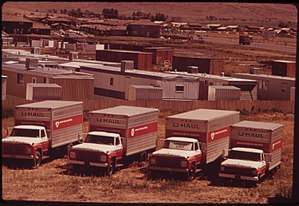
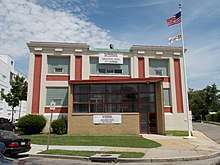
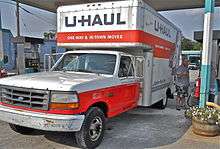
In 1945 at the age of 29 Leonard Shoen co-founded U-Haul with his wife, Anna Mary Carty, in the town of Ridgefield, Washington, with an investment of $5,000.[4] He began building rental trailers and splitting the fees for their use with gas station owners whom he franchised as agents. He developed one-way rentals and enlisted investors as partners in each trailer as methods of growth.
By 1955 there were more than 10,000 U-Haul trailers on the road, and the brand was nationally known. Distracted to some extent by growing his business, Shoen took time for multiple marriages and eventually had a total of 12 children, each of whom he made stockholders. Shoen transferred all but 2% of control to his children when two of them, Edward and Mark launched a successful takeover of the business in 1986. Family squabbling over the U-Haul empire turned to physical confrontations between some of his children at company meetings, even before the 1986 takeover. The takeover sparked a major family dispute that led to a $461 million judgment in favor of Leonard Shoen and others. In 1999, 83-year-old Leonard Shoen suffered fatal injuries when he crashed into a telephone pole near his Las Vegas, Nevada, home.
The Shoen family, currently led by chairman and president Edward "Joe" Shoen, owns about 40% of the company through their AMERCO holding company. AMERCO filed for Chapter 11 bankruptcy in June 2003 and emerged in March 2004. The filing did not include or affect U-Haul operations.
In 2012, another moving and storage company, PODS, sued U-Haul in U.S. District Court for trademark infringement, claiming that U-Haul "improperly and unlawfully" used the word "pods" to describe its U-Box product. On September 25, 2014, a jury ruled that U-Haul had infringed on PODS' trademarks, causing confusion and damaging business for PODS. The jury found that U-Haul unjustly profited from mentioning the term on its marketing and advertising materials and began using the word only after PODS became famous as a brand name in the industry. The jury awarded PODS $62 million in damages.[5] In 2014 UHaul sued HireAHelper for trademark infringement, a suit that was settled out of court.[6]
Each December, U-Haul is used by UPS, USPS, and FedEx, to help temporarily expand fleets to handle a surge due to Christmas and other holiday volume. [7]
Equipment
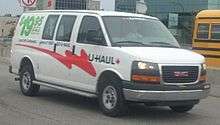
U-Haul's rental fleet is composed of trucks, trailers, auto-transports, and various other equipment. Heavy duty pickup truck and van cabs manufactured by Ford, GMC, and Ram are mated with U-Haul manufactured truck boxes in fabrication plants located at various places in North America. The vehicles are all gas powered, with previous models offering diesel 17-foot (5.2 m) trucks that must be brought back to the same location where they were rented. Six truck sizes are available, ranging from 10 feet (3.0 m) to 26 feet (7.9 m), and multiple trailer sizes, in addition to a two-wheeled "Tow Dolly" and a four-wheeled "Auto Transport". U-Haul advertises that their trucks have lower decks which are built below the tops rather than above the rear tires like standard cargo box trucks. Some trucks also have an over the cab storage area called "Mom's Attic." The trucks are painted with SuperGraphics which are educational images of different states and provinces across the United States and Canada.[8] Pickup trucks and cargo vans are also available at most corporate owned centers, and select neighborhood dealerships.
U-Haul has two main classifications for equipment in its fleet: "In-Town" and "One-Way". The "One-Way" equipment is mostly used for one-way trips, meaning pickup and drop off are at different locations whereas the "In-Town" equipment is meant to be picked up and dropped off at the same location and the equipment is meant to be used for a local move. U-Haul has been building new one-way vehicles en-masse, and as these one-way trucks are being built the older one-way fleet models are being retired to "In-Town" local use only while previous "In-Town" local use trucks are being de-imaged and sold.
All trucks owned by the U-Haul corporation (including those assigned and decaled for use in Canada) display apportioned Arizona license plates that do not expire. Newer trailers in the U-Haul fleet have apportioned plates, registered in a variety of states. In the Alaska and Hawaii markets, U-Haul registers equipment locally because those states do not have apportioned vehicle registration systems.
Storage space rentals
Some U-Haul facilities provide self-storage lockers for weekly or monthly rental, and rent portable storage lockers called U-Boxes on a monthly basis. The U-Boxes also serve to load customer possessions at one location that can then be shipped to another location. The storage facilities are located at most corporate locations.
Ford Explorer ban (model years 2010 and older)
U-Haul previously did not rent trailers intended to be attached to a Ford Explorer.[9] According to U-Haul: "U-Haul has chosen not to rent behind this tow vehicle based on our history of excessive costs in defending lawsuits involving Ford Explorer towing combinations. This policy does not involve safety issues. This is an unusual circumstance for U-Haul." This applies to all production years and models (for example, this ban includes the Ford Explorer Sport Trac) of the Explorer, regardless of tire brand that is attached. This comes from many accidents involving Bridgestone or Firestone tires.
Safety problems
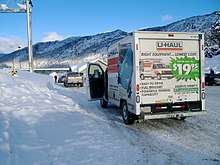
In Canada, various news agencies have found serious safety problems on U-Haul equipment. In July 2005, the Toronto Star reported statistics suggesting that about half of U-Haul vehicles in Ontario were not road safe. Shortly afterward, the Ministry of Transportation (Ontario) reported that, of 296 U-Haul vehicles inspected in the summer of 2005 (43.5% of all inspections performed), 58 (19.6%) were found to have out-of-service defects, meaning that they are not road worthy.[10] CTV followed in October 2005, conducting their own inspections across the country, and finding that all 13 rented U-Haul trucks failed to meet basic provincial safety standards.[11]
Replying to the Toronto Star, the company's Canadian officials cited its inspection policies and procedures that employees and dealers are expected to follow. In response to the CTV results, Canadian U-Haul vice-president admitted to not heeding earlier warnings to improve their vehicles' safety conditions, and said older trucks would be replaced.
In October 2006 CTV W-Five re-investigated U-Haul by renting trucks from 9 locations across Canada. The rentals were then taken to mechanics for an inspection. Of the 9 trucks rented, 7 failed basic safety standards and were not deemed roadworthy; the other 2, while roadworthy, had minor problems.[12]
On June 24, 2007, the Los Angeles Times published a story on U-Haul's safety problems titled "Driving With Rented Risks".[13] There were also related articles published such as "Upkeep Lags In U-Haul's Aging Fleet" and "Key Trial Evidence Goes Missing". The articles outline reports of ongoing maintenance problems, falsification of maintenance records and lawsuits against the company for injuries and accidents with quotes from former maintenance workers and executives.[14]
References
- "U-Haul Co. of Arizona : Private Company Information - Businessweek". investing.businessweek.com. Retrieved August 15, 2010.
- "AMERCO The parent company of U-Haul". amerco.com.
- CL King's 11th Annual Best Ideas Conference 2013
- Content Lawyerlinks
- Susan Thurston (September 25, 2014). "PODS wins $62 million award in trademark infringement lawsuit against U-Haul". Tampa Bay Times. Retrieved October 2, 2014.
- "What Happens When Your Startup Gets Sued by UHaul". Entrepreneur Magazine. December 9, 2014.
- Peterson, Hayley. "UPS drivers are making deliveries in U-Haul trucks — and people are panicking and calling the police". Business Insider. Business Insider. Business Insider Inc. Retrieved December 30, 2015.
- "About U-Haul SuperGraphics". Retrieved February 2, 2013.
- "U-Haul: Frequently asked questions: Truck rentals". uhaul.com.
- O'Brien, Danna. "MTO Rental Truck Blitz Takes 74 Vehicles Out of Service". CNW. Retrieved May 24, 2014.
- "Risky Move". CTV News. October 22, 2005. Archived from the original on October 31, 2005.
- "Danger on the Road". CTV News. October 21, 2006. Archived from the original on March 11, 2007.
- Miller, Alan C.; Levin, Myron (June 24, 2007). "Driving with rented risks". Los Angeles Times.
- Levin, Myron; Miller, Alan C. (June 26, 2007). "Key trial evidence goes missing". Los Angeles Times.
Further reading
- Fitzpatrick, Tom (December 1, 1994). "The U-Haul Tragedy". Phoenix New Times. Phoenix, AZ. Retrieved January 15, 2011.
External links
| Wikibooks has a book on the topic of: Packing & Moving Household Goods |
| Wikimedia Commons has media related to U-Haul. |
